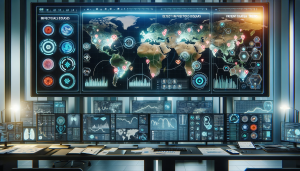 UseCasesFor.ai
UseCasesFor.ai
Choose Topic
 UseCasesFor.ai
UseCasesFor.ai
AI Use Cases
A collection of over 250 uses for artificial intelligence
A continually updated list exploring how different types of AI are used across various industries and AI disciplines,including generative AI use cases, banking AI use cases, AI use cases in healthcare, AI use cases in government, AI use cases in insurance, and more

Sign up
to receive a PDF containing all the use cases and stay updated with the latest AI trends and news (you can always unsubscribe)
Outbreak detection

Introduction
The healthcare industry has been one of the most progressive industries that has always aimed at developing new techniques of treating patients and preventing the occurrence of diseases. This paper aims at exploring how Machine Learning (ML) and Artificial Intelligence (AI) can be used in the management of data that has been rapidly increasing to facilitate outbreak detection. The use of ML and AI in outbreak detection has increased in the recent past and these technologies have been recognized in identifying and controlling epidemics including the Ebola and COVID-19. They have a great application in accumulating and assessing large data sets, and recognition of clues that may lead to identification of outbreaks at an early stage.
Challenges
There are however several challenges that affect the effectiveness of implementing ML and AI in outbreak detection. This is especially because health information is considered to be sensitive and thus, issues regarding data privacy and security arise. Another challenge is how to obtain enough high quality data for training the AI models. In addition, the issue of data heterogeneity poses a challenge in the health domain since it is difficult to compile and synthesize information from various data sets. The nature of diseases and how they spread, the dynamics of their spread and their relationship with human beings and the environment are some of the factors that make it difficult to develop accurate prediction models. Finally, there is a need of experts to connect the healthcare field with the field of artificial intelligence.
AI Solutions
The use of machine learning and AI has revolutionized the detection of outbreaks through the enhancement of data gathering, processing, and interpretation in the field of health. Some of the most effective algorithms in predictive analytics are capable of analyzing large datasets to recognize trends and forecast epidemics long before they actually happen. The capability of natural language processing enables the identification of outbreak indicators on social media platforms as well as online news feeds. Some of the techniques include deep learning which can learn complex correlations between diseases, human beings, and environment to enhance the accuracy of the models. AI can also consolidate information from various sources which helps in solving the problem of data congruence. Some of the companies at the forefront of using Artificial Intelligence in outbreak detection include BlueDot, Metabiota, and HealthMap.
Benefits
There are a lot of advantages of applying AI and ML in outbreak detection. Early detection leads to early intervention and can help in reducing deaths as well as the costs of treatment in healthcare facilities. AI can enhance the reliability of predictions thus aiding in enhanced decision making and resource management. It can also help in tracking the spread of diseases in real time and thus support the containment operations. In addition, the AI can also aid in evaluating the efficiency of the interventions made and come up with individualized treatment plans according to the person’s risk factors.
Return on Investment
The application of AI for outbreak detection can provide a high return on investment for the healthcare sector. Cost savings are realised from the lowered admission and management costs because of early identification and treatment. For example, a research done by Accenture revealed that AI applications have the potential of reducing costs by $150 billion for the US healthcare economy by 2026. Furthermore, AI can contribute to minimizing the economic impacts of outbreaks through early identification and isolation. Also, the investment in AI can also lead to cost savings, the development of new businesses, and increased competitiveness of the healthcare industry.